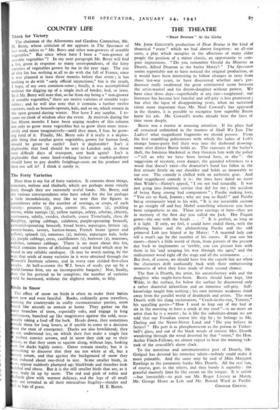THE THEATRE
.• Dear Brutus" At the Globe
Mn. JOHN GIELGUD'S production of Dear Brutus is the kind of theatrical " event " which we had almost forgotten: an all-star caste, a play which occupies in the affections of many older people the position of a minor classic, an opportunity to com- pare impressions. "Do you remember Gerald du Maurier as Dearth, Alfred Drayton as the butler Matey?" The Spectator seems regrettably not to have noticed the original production, or it would have been interesting to follow changes in taste from those last-war years, to have discovered whether one's pre- decessor really swallowed the great sentimental scene between the artist-wastrel and his dream-daughter without protest. We have since those days—superficially at any rate—toughened : our literature has become less fanciful and self-pity is less prominent ; but after the lapse of disappointing years, when no sustained talent more important than Mr. Noel Coward's has appeared in the theatre, it is possible to recognise how superbly Barrie knew his job. Mr. Coward's works already bear the lines of time more deeply.
Barrie was a master at arousing attention. If his plays had all remained unfinished in the manner of Shall We loin The Ladies? what magnificent fragments we should possess. From the first stumbling politenesses with which the ladies of Lob's strange house-party feel their way into the darkened drawing- room after dinner Barrie holds us. The exposure of the butler's theft, the feminine blackmail as they threaten him with the police —" tell us why we have been invited here, or else ": the suggestion of mystery, even danger, the guarded references to a wood that doesn't exist—the dramatist's hand has fallen in the first minute firmly on our shoulder and holds us inexorably to our seat. The comedy is chilled with an authentic grue. And what magnificent comedy it is: the lines have dated no more than Wilde's—Matey's appeal, "I am not bad naturally. It was just going into domestic service that did for me ; the accident of being flung among bad companions " ; Purdie making love, "You are so fluid, Joanna ; why are you so fluid?" and Purdie being strenuously loyal to his wife, "It is my invariable custom to go straight off and buy Mabel something whenever you have been sympathetic to me. Those new earrings of hers—they are in memory of the first day you called rue Jack. Her Paquin gown—the one with the beads . . ." It is perfect, so long as it is light. If only, we feel, it could have ended there, with the pilfering butler and the philandering Purdie and the odd primeval Lob just hinted at by Marcy: "A married lady can tell a man's age by the number of his razors. If you saw his razors—there's a little world of them, from patents of the present day back to implements so 'orrible, you can picture him with them in his 'and scraping his way through the ages," and the midsummer wood right off the stage and all the seriousness. . . . But then, of course, we should have lost the superb last act when the characters drift confusedly back with their embarrassing memories of what they have made of their second chance.
The flaw is Dearth, the artist, his unsatisfactory wife and the daughter who might-have-been. Barrie should have kept, like Wilde, to the surface, for below the surface he discovered only a rather shameful infantilism and an immense self-pity. Self- knowledge taught him nothing ; his own intimate weakness shied away from the parallel world of drunkards and artists. The man Dearth with his slang exclamation, "Crack-in-the-eye, Tommy," his appalling gusto—" How I used to leap out of my bed at six in the morning to have a crack at my easel "—is no more an artist than he is a waster ; he is like the substitute-dream we are told that our Freudian censor lets slip by ; he belongs to Mr. Darling and the Never-Never Land and "Do you believe in fairies? " His port is as phosphorescent as the poison in Tinker- bell's glass, and out of the black weeds of sinister Mrs. Dearth wandering through the wood deserted by that " rotter," the Hon. Archie Finch-Fallowe, we almost expect to hear the warning tick- tock of the crocodile's alarm clock.
To the notorious and unremunerative part of Dearth, Mr.
Gielgud has devoted his immense talent—nobody could make it more palatable. And the same may be said of Miss Margaret Rawlings as the passionate husky Mrs. Dearth. All the real fun, of course, goes to the others, and they bandy it superbly : the graceful masterly lines lie like cream on the tongue. It is unfair —but irresistible—to pick out Mr. Roger Livesey as Matey, Mr. George Howe as Lob and Mr. Ronald Ward as Purdie.
GRAHAM GREENE.






























 Previous page
Previous page